Spread the Good Word
No! Not that “Good Word.” This blog post is not about religion. But I am writing it with a sense of missionary zeal for spreading the many compelling topics, helpful strategies and resources I learned about recently while attending the Symposium hosted by Utah Governor Spencer J. Cox, Aging with WISE Purpose: Improving Wealth, Independence, Security and Engagement. I left with a head and a notebook full of ideas for future blogs, but I just couldn’t wait to give you a taste of some of what were the highlights for me.
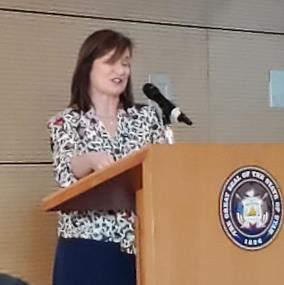 As someone who cares deeply about caregiving and caregivers and has researched and
written about related topics for twelve years, the Symposium filled me with a renewed
sense of purpose and of being supported in my efforts by some of the best and brightest
in Utah and from around the Country.
As someone who cares deeply about caregiving and caregivers and has researched and
written about related topics for twelve years, the Symposium filled me with a renewed
sense of purpose and of being supported in my efforts by some of the best and brightest
in Utah and from around the Country.
We were welcomed and introduced to the symposium and its multi-faceted purpose by Salt Lake County Mayor Jenny Wilson. The health challenges of aging, Wilson said, “…do not call solely for solutions from one level of government or another or from nonprofits. Rather, we are in it together.” As an 81-year-old who writes about healthcare and aging, I immediately felt included in the discussion.
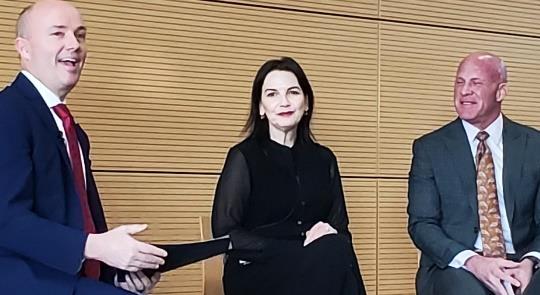 Gov. Cox not only participated in a Keynote Armchair Discussion with Dr. Julianne
Holt-Lunstad, BYU Social Connections and Health Research Lab director, and Rob Allen,
CEO and President of Intermountain Health, he stayed throughout the entire four-hour
symposium listening intently and taking notes.
Gov. Cox not only participated in a Keynote Armchair Discussion with Dr. Julianne
Holt-Lunstad, BYU Social Connections and Health Research Lab director, and Rob Allen,
CEO and President of Intermountain Health, he stayed throughout the entire four-hour
symposium listening intently and taking notes.
Holt-Lunstad stressed that social connection and interaction is “not just important for emotional well-being, it’s critical for physical health. Allen pointed out that the ability to age-in-place depends on early detection, financial stability and “moments of connection.” Gov. Cox reminded us that during the pandemic, people learned how to be disconnected. “Our default is no-face-to-face connection….We’ve got to stop that.”
A consistent theme was the need for all attendees to do a better job of making the general public more aware of all the resources available to the elderly and their caregivers. Somehow, we need to get more connected and figure out how people across the state can meet the need to care for the rapidly growing number of older adults.
The remainder of the symposium consisted of four panels of experts in their field, each focusing on topics related to one of the letters in the acronym WISE: #1) Wealth: Retaining Income, #2) Independence: Aging in Place, #3) Security: Preventing Predatory Practices, and #4) Engagement: Maintaining Wellness and Connectedness. This clever grouping of content doesn’t begin to describe the amount of information, wisdom, compelling statistics, and forward-thinking solutions and strategies presented in the program. My interest never wavered throughout the entire four hours.
#1 - Wealth: Retaining Income
(Moderator: Casey Cameron, UT Dept. of Workforce Services; Sen. Wayne Harper, UT Senate District 16; Rep. Walt Brooks, UT House District 75; Robert Spendlove, Zions Bank; and Mallory Bateman, Kem C. Gardner Policy Institute)
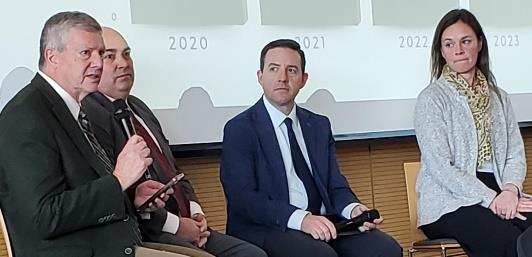 I feel like I need to have a meeting with my children and grandchildren based on what
I learned from this panel. They put the responsibility of having enough money for
a comfortable retirement squarely on the shoulders of those who are still in the workforce.
Currently, only 51% of Utah households have “some retirement,” and Zion’s Bank’s Spendlove
told us that in retirement people generally need “25 times what they expect to spend
in a year or eight times their income. Someone is going to have to pay for their care.”
More about that in a future blog.
I feel like I need to have a meeting with my children and grandchildren based on what
I learned from this panel. They put the responsibility of having enough money for
a comfortable retirement squarely on the shoulders of those who are still in the workforce.
Currently, only 51% of Utah households have “some retirement,” and Zion’s Bank’s Spendlove
told us that in retirement people generally need “25 times what they expect to spend
in a year or eight times their income. Someone is going to have to pay for their care.”
More about that in a future blog.
#2 – Independence: Aging in Place
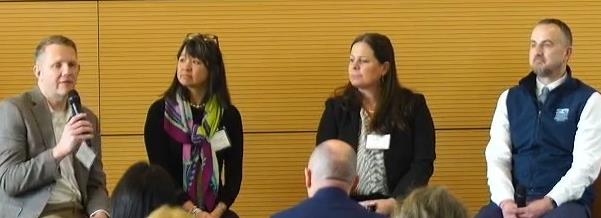 (Moderator: Nels Holmgren, Utah Division of Aging and Adult Services; Matt Hansen,
Homecare & Hospice Association of Utah; Valerie Chang Greer, University of Utah) Dr.
Beth Fauth, Alzheimer’s and Dementia Research Center, Utah State University; Paul
Leggett, Salt Lake County Aging Services)
(Moderator: Nels Holmgren, Utah Division of Aging and Adult Services; Matt Hansen,
Homecare & Hospice Association of Utah; Valerie Chang Greer, University of Utah) Dr.
Beth Fauth, Alzheimer’s and Dementia Research Center, Utah State University; Paul
Leggett, Salt Lake County Aging Services)
I almost cheered out loud when Dr. Fauth said, “Don’t ever tell your parents they won’t have to leave their home.” Several people I know have said that and then found themselves in impossible situations. After other panel members gave sage advice on what needs to be done to make aging in place possible, Fauth wisely pointed out, “Cognitive impairment is the tipping point for being able to stay in our homes.” With the number of people diagnosed with Alzheimer’s doubling every year, there is definitely more to aging in place than most people might think. I can’t wait to enlarge on that in a blog.
#3 – Security: Preventing Predatory Practices
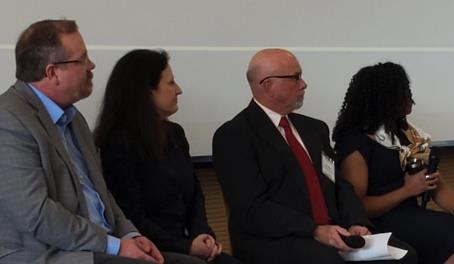 (Moderator: Melanie Hall, Utah Department of Commerce; Jay Haapala, AARP Utah; Katie
Hass, Consumer Protection Division, Utah Dept. of Commerce; Coy Acocks, Office of
the Attorney General; Francswai Grayson, Division of Securities, Utah Department of
Commerce)
(Moderator: Melanie Hall, Utah Department of Commerce; Jay Haapala, AARP Utah; Katie
Hass, Consumer Protection Division, Utah Dept. of Commerce; Coy Acocks, Office of
the Attorney General; Francswai Grayson, Division of Securities, Utah Department of
Commerce)
I’ve already written two blogs on fraud published here, but in neither of them do I mention something new I learned, which is that on average older adults lose the largest amount of money to fraud perpetrated by family members or other persons of trust. Sad to say, it’s their own children or another person they trust who manage to dip into their savings, sometimes depleting all of it. This and other fraud schemes are often not reported by them because they are ashamed that they succumbed to it or don’t want to get a family member in trouble. Protecting ourselves from that type of fraud is something for all of us to think about, regardless of how unlikely it might seem.
#4 – Engagement: Maintaining Wellness and Connectedness
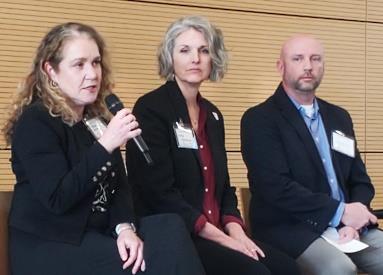 (Moderator Rob Ence, Executive Director of the Utah Commission on Aging; Alayne Markland,
Chief of the Division of Geriatrics and Director for the University of Utah Center
on Aging; Emily Christensen, Utah Creative Aging Coalition & Music Therapist; Kyle
Case, Huntsman World Senior Games)
(Moderator Rob Ence, Executive Director of the Utah Commission on Aging; Alayne Markland,
Chief of the Division of Geriatrics and Director for the University of Utah Center
on Aging; Emily Christensen, Utah Creative Aging Coalition & Music Therapist; Kyle
Case, Huntsman World Senior Games)
Where to start on this one! I’m just going to make a list of the topics mentioned by these panel members, moderated by Rob Ence, the Executive Director of the Utah Commission on Aging. I want to investigate each of them more deeply:
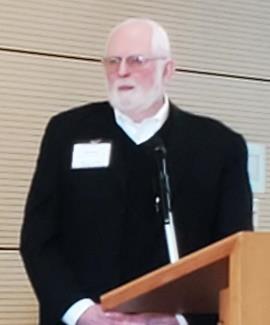 Utah agencies are resources for both those who need care and their caregivers.
Utah agencies are resources for both those who need care and their caregivers.- Ageism, or false notions about aging that can be held not only by employers and health care workers, but by each of us, no matter what stage of aging we are in. We are all aging!
- Train the next generation to move past fear into familiarity to encourage trying new things throughout life.
- Age-friendly healthcare and educating the workforce necessary to make it more available.
- Music therapy and how it can affect all behaviors in those with cognitive impairment.
- The importance of exercise and how we are motivated by competition to do more.
- How to lessen the difficulty of adapting to aging.
- Volunteerism: a way to make use of the skills of our older population and to help prevent social isolation.
I wish you could have been there, but the Symposium’s theme of connectedness gives me hope that everyone who was there will do even more to spread the good word about all the resources available to and for the aging population of Utah. What you just read is my first attempt to do more of that.
